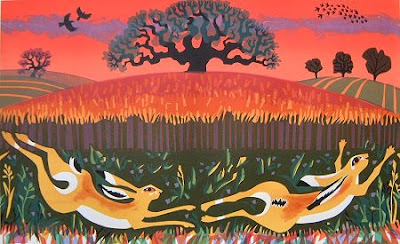
Folk present last Saturday at the Festival in Helpston will remember our President, Ronnie Blythe's, address -- "Ploughing and the ploughman" [my title]. Surprise, today in the
Church Times, Ronnie's weekly piece "... reflects on the mysteries of man and plough."
Speaking to Ronnie during the afternoon last week, I asked if I might use his pieces in this way --- he replied "of course you may". But remember the original is on the back page of this week's CT newpaper under Ronnie's normal title, "Word from Wormingford".
He writes:
WHAT with weather, what with machinery, farmland soon becomes out of knowledge. I have two acres, and all the other acres grow around me. The contours stay mainly unchanged, yet at the same time mysterious. There is a slight amphitheatre-like rise above Lower Bottoms, and what must have been a Slough of Despond in the Top Field for many a plough.
The old horseman (East Anglian for ploughman) tells me how it was when he drew his first furrow, setting it against a holly bush in the distant hedge. Hedgers never levelled a holly, and I see them round the village still, many of them tall trees. “It would have been about February,” said the horseman. And I see the horseman as a slight, youthful figure hip-hopping along behind his Punches, the plough tipping and reeling, its share striking sparks from the everlasting flints.
In the late 19th century, during that nadir of English agriculture, when even the horsemen, the princes of the fields, were broken and half-beaten, Henry Rider Haggard, who farmed in the Waveney Valley, watched the February ploughing with humility, familiar as he was with it.
As during our present summer, it rained and rained, although with less eventual ruination of rural life. He had spent his 20s in South Africa, filling his head with the tales that would become King Solomon’s Mines and She (who-must-be-obeyed). Then it was back to Norfolk and this shocking sight of white men in the mud. His men, his demanding fields.
It was 1898 when farmworkers, even the noble horsemen, were all lumped together in the popular mind as labourers, skill-less creatures whose duty it was simply to toil. While Haggard was shocked by their servitude, he began to see their art; for their work was nothing less. He wanted to destroy the huge social barriers that cut him off from his men, but it was not only impossible, but unthinkable.
In an Egyptian pyramid, he had seen a beautiful fresco of a king and his harvesters all rejoicing in a field together, the corn shining in their arms. If only Norfolk could be like this! If only his labourers would speak to him! He could afford to pay them twice their wage, but it would put Norfolk’s economy out, of course. So he told the world how they worked, with what brilliance, with what strength.
“Ploughing is one of those things that look a great deal easier than they are, like the writing of romances. The observer, standing at a gate to watch a man with a pair of horses strolling up and down a hill for hours on end . . . is apt to conclude that, beyond the physical endurance involved, the difficulties are small. Let him take the pair of horses, however, and plough for, say, 40 minutes, and he will come away with a greatly increased respect for the ploughman.”
As boys, we watched Captain Cardy’s plough surge to the headland like a tall, clomping horse-wave, wheel, and flood back. He had fought on the Western Front, and I always imagined to myself the jingling of the horse-brasses with the jingling of his medals. He did not call out to us.
The irony was that when all the young men fled the collapsing farms for the glory of soldiering, they were set to digging trenches — vast ditches made with spades by regimented labourers. The horsemen rode. Nobody dared beat their bayonets into ploughshares. Everyone dreamed of their own church bells and forgot their own ditches and bush-draining. From No-man’s-land they dreamed of Someone’s-land.
When I went to see Passchendaele some years ago, it was drizzling, but the mud was unlike the mud here. It was silvery in the trodden grass.
“Word from Wormingford” -- Church Times [20th July 2007]
 [Image from Carry Akroyd’s linocut illustrating August from “The
[Image from Carry Akroyd’s linocut illustrating August from “The









